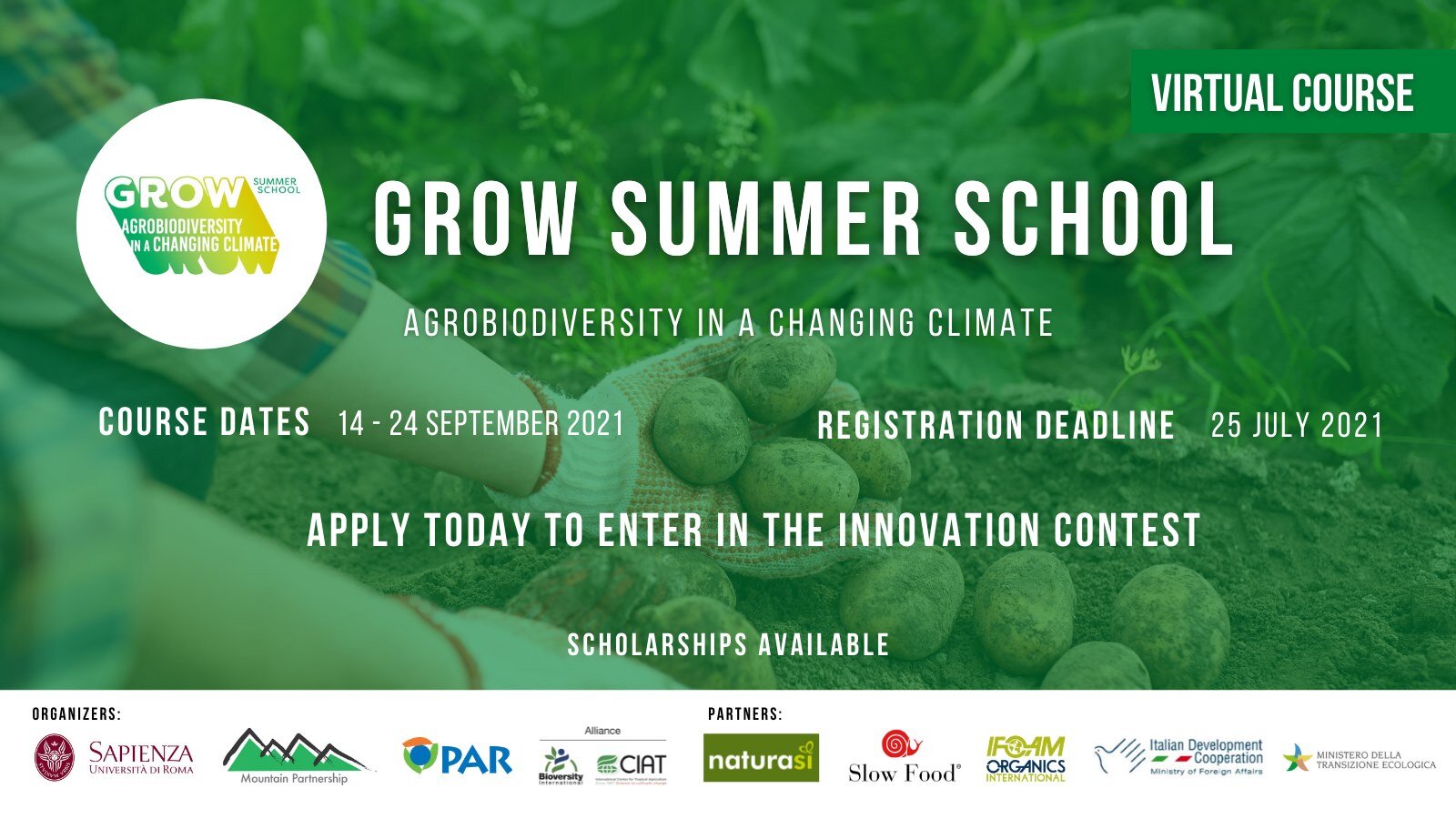Applications Open: GROW Summer School 2021
Introduction:
Taking into account agrobiodiversity in food systems means bringing together the sectors of science, agriculture and economy to propose new food production strategies that can be implemented in a changing environment, promoting diversified crops and practices as a resource and increased variety as a strength in agro-ecosystems. In addition to agricultural and genetic aspects, the agrobiodiversity discussion focuses on economic and social issues, such as identifying markets for biological products, developing adequate value chains and marketing strategies, and preserving local crops.
It is essential to enable community-driven food systems that provide the best possible outcomes for producers and consumers. In this model, producers and consumers are connected through short, transparent, direct value chains. Producers are incentivized to develop or conserve quality-based production models that are then rewarded with a price premium by consumers. Conversely, consumers are able to access culturally appropriate, safe, nutritious food at affordable prices.
Objectives and participants:
The course will focus on the importance of biodiversity in agriculture, with particular focus on biodiversity’s role in enhancing cropping and farming systems’ resilience and adaptability to climate change.
The course lectures will illustrate principles and practices for gathering agrobiodiversity data through either participatory diagnostic or empirical approaches, and for their utilization to develop management approaches that improve resilience and adaptability.
The course will also analyse the economic value of agrobiodiversity in food systems as an incentive for conservation. It will investigate the most critical management aspects along the agricultural value chain, ranging from production to marketing and consumption.
A set of tools and methodologies for improving market access of neglected and underutilized foods and the role of gastronomic heritage as a driver for rural development will also be presented in the course.
The aim of the course is to equip participants with the necessary tools, knowledge and understanding to enhance productivity and improve marketing strategies in sustainable and resilient agricultural systems.
The training will include lectures by speakers from various national and international organizations.
Upon the completion of the training (75 percent attendance of the course is required), the students will be awarded six CFU/ECTS credits (Crediti Formativi Universitari/European Credit Transfer System).
Participants will be selected based on the following criteria:
At least BA/BSc or MSc degree in agriculture, agronomy, forestry, botany, geography, natural resource management, environmental science, rural development, socio-economic sciences or a related field;
Good knowledge of English;
Working experience with national or local institutions, farmers’ organizations, civil society organizations or research institutions that have a specific interest/involvement in the improvement, strengthening and valorization of value chains derived from local agrobiodiversity in mountain areas is desirable; and
Previous involvement in the Mountain Partnership Products Initiative is desirable.
View the course programme.
The application deadline for the 2021 course is 25 July 2021. There will be a limited number of participants, so be sure to apply before it’s too late! Click here to complete the application form.
Innovation contest:
All GROW Summer School 2021 applicants will have the opportunity to participate in the innovation contest “Improving smallholders’ livelihoods through agrobiodiversity and organic solutions” by submitting their innovative ideas in response to this year’s theme:
“How would YOU improve smallholders’ livelihoods through agrobiodiversity and organic solutions, especially in such fragile ecosystems as mountains and islands?”
A brief proposal (up to 400 words) shall be submitted during the registration to the GROW Summer School, via the application form.
During the GROW Summer School, all participants will further develop their proposals, by applying what they have learned, exchanging ideas with others, and taking advantage of the diversity of cultures, backgrounds and competencies of participants and lecturers.
Proposals can include business models, community-based best practices, digital applications, marketing tools, policy measures, trainings approaches, community networks, etc.
The winning proposal will be selected based on the following criteria:
• Innovation
• Feasibility
• Sustainability
The winning proposal will be announced on the last day of the course. A certificate will be awarded to the winner.
Organizers:
The GROW course organizers include Sapienza University of Rome, Department of Environmental Biology; Alliance of Bioversity International and the International Center for Tropical Agriculture (CIAT); the Platform for Agrobiodiversity Research; and the Mountain Partnership Secretariat. Technical support is provided by the Food and Agriculture Organization of the United Nations (FAO).
Coordinator:
· Giorgio Grussu – FAO - Mountain Partnership Secretariat
Course managers:
· Valeria Barchiesi – FAO - Mountain Partnership Secretariat
· Francesca Buffi – Department of Environmental Biology, Sapienza University of Rome, Italy
Scientific directors:
· Fabio Attorre – Department of Environmental Biology, Sapienza University of Rome, Italy
· Devra Jarvis – Platform for Agrobiodiversity Research (PAR), Maccarese, Italy
Official course language: English
When: 14 – 24 September 2021, Virtual lessons on Microsoft Teams, four hours per day
Enrolment fee: 200 Euro
Application deadline: 25 July 2021
Scholarships: Scholarships are offered for the course. Participants can apply for a scholarship in the application form.
Location: Live online classes, sessions from 14:00 to 18:00 (Rome time, UTC/GMT + 2 hours). Recorded lectures and additional materials can be accessed by the participants enrolled in the course at any time.
Contact for more information: caf_cropgeneticdiversity@uniroma1.it

